No Need to Hurry - An Interview with A Cruising Sailor
“You don’t need to hurry. Take your time! We are all used to planning our lives days, weeks, or even months in advance. But it doesn’t work that way on a sailboat." - Brandon Keepers
I've never meet Brandon Keepers in person, but I feel like we've got a connection and share a fair amount in common. We've both lived in West Michigan. We both learned to sail and cruise on Lake Michigan. We both have a passion for cruising sailboats and helping others connect with their cruising dreams by sharing information online.
Brandon and his wife Dustyn are full-time cruisers who are currently exploring the Bahamas. Brandon, along with his friend Andrew, also started a really useful website (Sailboat.Guide) for cruising sailors looking for a boat and those who are hoping to become cruising sailors. I find both of those activities of interest since I have my own cruising plans tucked away somewhere in the recesses of my brain and I've been working for over a decade now creating SailFarLiveFree.com as a useful resource for sailors. I'm also interested to hear what it's been like to be cruising during the Coronavirus pandemic. And so, after exchanging a few emails and sharing a phone conversation, Brandon agreed to participate in the interview below in an effort to pass along some cruising experience and motivation.
SFLF: Tell me a little about your background and how you got into sailing and cruising?
Brandon: We both remember our first time on a friend’s sailboat: the engine cut off, and the wind and the waves were the only sound we could hear. Ten years would pass before we found our way into sailing ourselves and were able to feel that again.
In 2016, we sold our house in West Michigan and most of our possessions in preparation for moving to the Chicago area for my wife Dustyn to go to grad school. We knew that we wanted to travel after she finished course work. We imagined an RV road trip around the US, or AirBnBs in exotic destinations, or even backpacking across Europe, but living on a sailboat never occurred us. As we were soaking in the views in Traverse City, MI during one last weekend up north before we moved, I remember seeing a (in retrospect, very small) sailboat for sale. “A sailboat is only $5,000?. We should buy a sailboat!”, I thought and apparently said out loud. Dustyn assumed I meant “…someday”. We didn’t know how to sail, and had only been on that one sailboat. “Maybe we should learn to sail first?” she said, logically.
Sans sailboat and most of our possessions, we moved into an apartment in the Chicago area and fell into the bustle of daily life in the burbs. A year passed, and we were growing tired of the concrete jungle of the city. The nearest pure nature was a 45 minute drive away. We talked more seriously about our plans after we left Chicago and started exploring options. We took a few weekend camping trips, but just couldn’t imagine ourselves living in campgrounds.
Remembering our conversation about buying a sailboat, we found 3rd Coast Cruising, a sailing club in down town Chicago that offers the best view of the skyline and the opportunity to learn to sail. We signed up for a trial run, and immediately were reminded of that moment when the engine cuts off and all you hear is the wind and waves. We were hooked. We joined the club and went sailing almost every night after work, and twice a day on weekends. We learned from others in the club, and taught each other. Sailing with the convivial captain Jim Miranda, who ran the club, was a special treat that promised new learning opportunities often in extreme conditions, usually accompanied by badges like “Gale Chaser” or promotions to “Second Mate” status in the club.
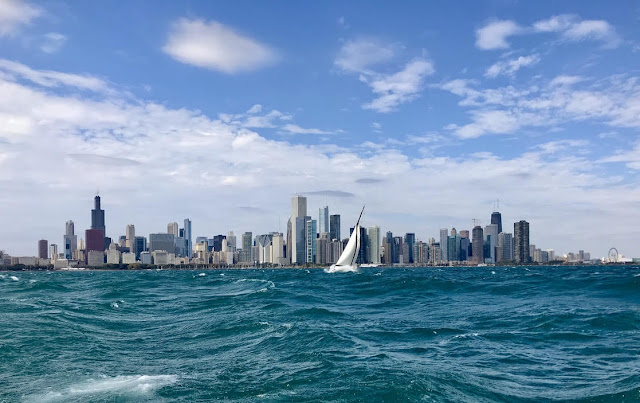 |
| Sailing in 35+ knot winds with 3rd Coast Cruising in Chicago |
The sailing season came to a close and we helped move the sailboats down the Chicago river in November for offseason storage, but we couldn’t stop obsessing, Evenings after work were spent watching sailors on YouTube, reading books about sailing, and studying for certification courses online. We spent Saturdays with 3rd Coast Cruising in the boat yard learning how to grind out and repair fiberglass. We did a weeklong intensive in the Gulf of Mexico with a captain over the holidays. By mid-winter we were boat shopping, and before spring had sprung we owned a sailboat.
SFLF: Where have you cruised from and to so far? What have been your favorite locations and stretches of the journey?
Brandon: Our first season we lived aboard and cruised around Lake Michigan. From Chicago, we went up the coast of Wisconsin to Door County, then across Lake Michigan to the Sleeping Bear Dunes area and spent time in Grand Traverse Bay and Beaver Island. The season was getting late, so we headed south to West Michigan, and eventually back across the lake to the Chicago area for winter. We loved our first season cruising Lake Michigan, and learned two things: 1) We wanted to see more of the Great Lakes, and 2) we didn’t want to stop cruising for the winter, which meant heading to the East Coast and turning south.
So the next season, we took the first weather window in June 2019, and crossed still-frigid Lake Michigan from the Chicago area to Saugatuck, MI. We spent the next few months working our way up the coast of Michigan, through the Straights of Mackinac, into the North Channel and around the northern shore of Georgian Bay. From there we entered the Trent/Severn Waterway in Ontario, crossed Lake Ontario to Oswego, where we entered the Erie Canal and headed down the Hudson River past the statue of liberty in New York harbor and into the Atlantic Ocean.
We sailed up the Delaware River and into the Chesapeake Bay, and then made our way down the coast. We did occasional stints in the Intracoastal Waterway or, when the weather was cooperating, took 1-2 day passages offshore until we reached Florida. We crossed into the Bahamas after the new year in 2020, and have spent the last several months exploring the Berry Islands, Eleuthera, the Exumas, and now the Ragged/Jumentos Islands.
We’ve seen some amazing places, so it’s hard to pick favorites. The Great Lakes will always have a special place in our hearts. We love the Michigan shore and all the towns around it. We often tell non-Great Lakes sailors about the North Channel of Lake Huron and it’s abundance of beautiful, secluded coves and anchorages. It is one of the most surreal places we’ve ever been. Even in the crystal clear Bahamian water we occasionally miss diving into the cool fresh water of the Great Lakes! If your draft allows it, the Trent/Severn Waterway is a fascinating way to explore the lakes and towns of Ontario and see a bit of history through its 43 well-preserved locks and lifts run by the Canada Parks service.
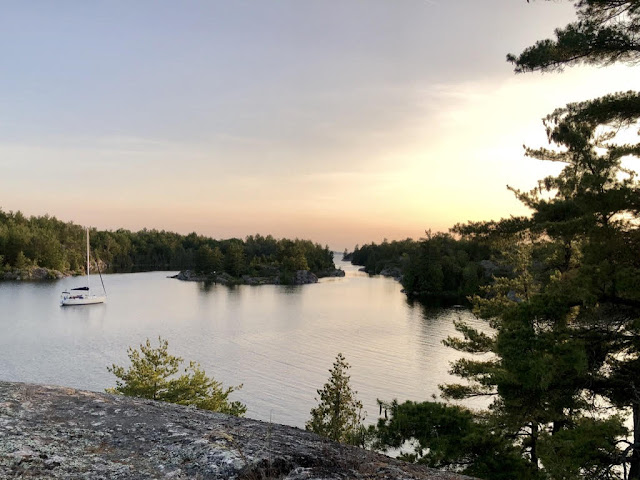 |
| Long Point Cove in the North Channel of Lake Huron |
The Hudson River was a pleasant surprise. After exiting the Erie Canal and making the turn south down the Hudson, we re-stepped the mast and were eager to sail. “You can’t really sail the Hudson River” was a common refrain we heard from other sailors, but we sailed almost all of the roughly 150 nautical miles from Albany to New York City, only running the motor a few times to make it around a bend that put us straight into wind, or to ensure we had maneuverability while a large ship passed. The incredible views of the Hudson River valley—the cool morning mist, West Point on a warm and sunny fall day, the sunrise that lit up the The Palisades on one side of us and the distance view of New York City on the other—made this stretch one of our favorites.
The more remote and less crowded islands in the Bahamas—like the Berry Islands and the Jumentos/Ragged Islands—have been our favorite. They require you to be self-sufficient on your boat to be in these places, but the trade off is exploring the natural beauty that isn’t so commercially hyped, and occasionally having an anchorage or a whole deserted island to yourself.
Anchored at Double Breasted Cay in the Jumentos Islands, Bahamas.
SFLF: What's the endgame for you concerning cruising? Do you plan to cruise indefinitely or is there a destination or date you're going for?
Brandon: We intend to cruise “as long as it’s fun”. We don’t really have plans, but we have some aspirations. Before we left on this adventure, we chartered in Grenada and loved it. So when we cast off from Chicago, we hoped to sail our own boat from Chicago to Grenada, taking our time to explore all the incredible places in between.
With travel restrictions during the pandemic, it looks like we won’t make it there this year, but we are taking it a day at a time. We will likely have to come back to the US for the summer—and hopefully explore more of the Chesapeake and maybe head up the NE coast to Maine—and then probably cruise toward Grenada next year.
Beyond that, we don’t know.
SFLF: So what's it like being on a cruising boat during the Covid-19 outbreak? Do you feel safer or more at risk on your sailboat?
Brandon: It is bizarre and incredible.
In some ways, the pandemic hasn’t changed anything about our day-to-day life. We’ve spent the last two years learning to be self-sufficient, outfitting the boat with essentials like solar and a water maker, learning how to deal with emergency situations, and stockpiling months worth of food. Basically, being a cruiser is a socially acceptable form of being a “prepper”.
We are hunkered down in the Ragged/Jumentos Islands, Bahamas. These remote islands are uninhabited, with the exception of Duncan Town, a settlement with 15 people in the southernmost island. There are no grocery stores around, but we have been able to to get provisions and fuel delivered from Nassau via the mailboat that brings supplies to Duncan Town. While we are well-stocked on the necessities, we are out of a few luxury items like alcohol (liquor stores are considered “non-essential” during the current government shutdown in the Bahamas) and fresh goods that don’t travel well on the boat.
We are so secluded that we feel very safe. Our only interactions are with a group of boats that have all been here since the pandemic started, so we are able to forgo most of the physical distancing protocol that the rest of the world is observing. By sharing skills and supplies, we’ve been able to drastically increase our self-sufficiency: spearfishing to supplement our meat supply, trading essential provisions like water, bread yeast, and toothpaste, fixing critical equipment like a refrigerator and a computer, making moonshine to replenish the depleted alcohol supply, growing fresh herbs, loaning tools and parts, and giving haircuts. We’ve had our share of fun too: constructing a makeshift “yacht club” out of bamboo and tarps, group workouts/relay races, cooking meals over a fire, kite boarding, and just general shenanigans around a fire pit.
 |
| Distilling moonshine over a fire on a remote island in the Bahamas. |
While our day-to-day life hasn’t changed that much, our thoughts are occupied by people back home, many whose lives have been drastically altered. These are strange times for all of us, but we feel so fortunate to be “stranded” with some great people in such a beautiful place.
SFLF: How are you finding your cruise?
Brandon: It has been amazing. We spent the last year exploring some of the most beautiful places we’ve ever seen. We skipped winter and freezing temperatures for the first time in our lives. The hustle and bustle of our former life is gone, which means we wake up each day and decide what we want to do that day. If it doesn’t get done, there’s always tomorrow. Of course, in this life we are constantly watching the weather and monitoring the boat’s systems, so it’s not all cocktails and sunsets, but there’s plenty of that too.
While our quality of life has been great, our hearts are also heavy as every place we visit we witness the challenges of local people to sustain their way of life, and the impact that we all are having on these beautiful places. We’ve seen so many towns that never recovered from boom and bust of past unsustainable industries, and many more that feel like the world just left them behind. We’ve seen reefs and oceans ravaged by pollution and over fishing, and heard the laments of the communities whose generational livelihoods are disappearing along with the fish.
 |
| Trash that has washed ashore at Man o’ War Cay in the Jumentos Islands |
As we grow into this more self-sufficient and laidback lifestyle, we are often aware of our own impact on the world around us, our dependence on others, and just how privileged we are to be able to live this life. We try not to take it for granted.
SFLF: Tell me about Sailboat.guide and how it started.
Brandon: Sailboat Guide is a website to help you discover your dream boat. It was started by my friend Andrew Bredow and I in 2019 with the goal of bringing a more modern resource to the sailing community. We both have spent our whole careers so far working in tech, and we were looking for a way to combine our passion for sailing and software.
For me personally, Sailboat Guide started when we decided to go cruising. “Living on a boat rewires your brain, and when you come back, nobody will understand.” These words of caution from Captain Jim Miranda at 3rd Coast Cruising as we were preparing to spend our summer sailing around Lake Michigan proved to be prophetic. I worked for a Silicon Valley tech company, and was able to work while we cruised during that first season. But when we came back to land for the winter, I found myself less and less interested in holding my nose to the grindstone. I submitted my resignation and began readying the boat for our cruise south the next season. Andrew and I began exploring the market to find something at the intersection of sailing and software that was interesting and had potential to be sustainable.
Through our own experience, attending sailboat shows, and talking with fellow sailors, we feel like we’ve narrowed in on an audience that is underserved and growing: people buying inexpensive used sailboats and fixing them up. While new boat sales ebb and flow, there is always a plethora of used boats available for a reasonable price to anyone willing to strap on a dust mask and learn new skills. The previous generation of sailors have taught us how to “go small, go simple, go now”, and the YouTube sailing channel craze has made it feel attainable for any age and skill level.
We are building Sailboat Guide to help aspiring sailors find the right sailboat that suits their current aspirations, whether it’s day sailing, weekend cruises, summer getaways, or living aboard full-time. When they’re ready to say goodbye to their boat, Sailboat Guide can help them sell it. Over time, we also intend to make the process of buying and maintaining a boat more accessible, providing resources to help with the selling process, and guides for fixing and improving the boat.
If you’re interested, follow Sailboat Guide on Instagram or Facebook.
SFLF: What's your favorite thing about cruising? Least favorite?
Brandon: It’s impossible to describe the feeling of independence and freedom that we feel. We have enough provisions to last weeks/months, we make electricity from the sun, we make drinking water from the ocean, and we can move our home to a different beautiful spot whenever we want. It’s been months since we’ve seen a sign that said “no alcohol on the beach” or “dogs must be on a leash”. I don’t remember the last time I wore real shoes. These are freedoms that many people gladly trade for guaranteed comfort and security.
While our life on the boat is much simpler than it was on land, it’s also a lot of work. We wash our clothes by hand in a cooler. The harsh marine environment means something on the boat is always in need of maintenance. Getting mail and packages delivered is impractical and often impossible. Some days, you feel like giving it all up in exchange for ordering pizza delivery or going out for a hamburger and beer.
SFLF: What's something you wish someone told you prior to starting your cruise?
Brandon: “You don’t need to hurry. Take your time!”
We are all used to planning our lives days, weeks, or even months in advance. But it doesn’t work that way on a sailboat.
When we left, we had a plan for where we roughly needed to be each month in order to get far enough south for winter. Lake Huron by July, Trent/Severn by August, New York by September, Chesapeake by October, North Carolina by November, South Carolina by December, Florida by January. We roughly mapped out the miles and figured out that we needed to average 140 miles/week to achieve it. Self-induced stress of sticking to this timeline was the hardest part of the trip. When we got to North Carolina, we hauled out to do some boat work. After a few delays, and stress from the delays, we finally allowed ourselves to let go of the schedule and live in the moment.
SFLF: What's your favorite piece of cruising gear that you'd recommend for others?
Brandon: We took electricity and drinking water for granted when we were living on land, but on the boat in remote places, we have to make our own. So we couldn’t live without our solar panels and a water maker. We occasionally exclaim to each other: “We are making drinking water from the ocean and the power of the sun!”
We have two large solar panels (from solar-electric.com) that provide up to 630 watts of power, which is more than enough to keep our batteries topped up, run our refrigerator, charge our electric dingy motor, phones, and computers, and run the handful of other appliances and electronics that we use day-to-day. Most importantly, our solar panels allow us to run our water maker (Spectra Catalina 340z), which runs on our 12v DC electrical system and produces 14 gallons per hour of fresh drinking water from salt water.
SFLF: Is there anything you wish I would have asked?
Brandon: I’ve probably written more than you wanted for now, but if your readers would be interested in any of these topics, I’d be happy to answer any of them:
What piece of cruising gear do you wish you had? (Or: What’s your next upgrade?)
What’s it like cruising with a 65 pound dog?
Do you have guests on board? How does that work out?
What boat do you have? What do you love about it?
SFLF: Thanks so much for sharing some of your experiences. If anyone reading wants more information, please leave a comment below or send an email and we'll make sure Brandon sees it.
If you like this interview format, check out some of the other interviews we've done here on SFLF:
- Sailboat Designer Mini-Interview Series with the following: German Frers, Ron Holland, Chuck Paine, Bob Johnson, Bill Dixon, and Bob Perry
- An Artist of Words, Wind, and Women - Webb Chiles Interview
- A Backstage Pass to the Sailing Podcast with David Johnson
- An Interview with Andy Schell from 59-North
- A Circumnavigation with Two Girls and a Tree Named Makeba

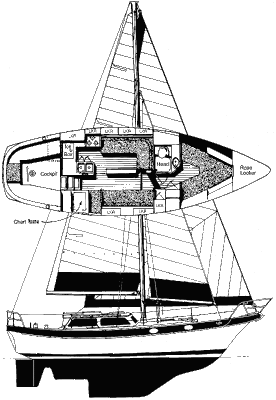
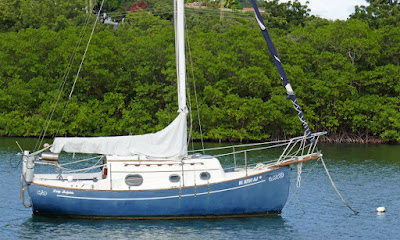
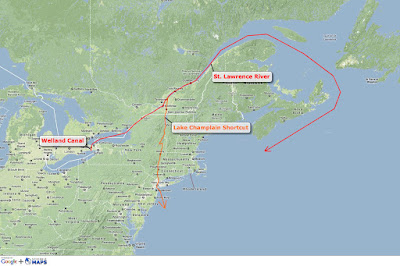
I always find in interesting how different people fund these life styles.
ReplyDeleteAnd what is it you’re cruising on?
ReplyDeleteEric from Milw WI.
Planning on leaving via sailboat in 2024.